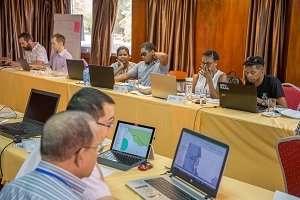New data tool to support the move from fossil fuels to renewable energy launched by IEA

The Institute for Environmental Analytics has launched a renewable energy planning tool in the Seychelles, where it has been welcomed by the government as a boost towards its target of 100 percent renewable energy generation.
RE-SAT (Renewable Energy Space Analytics Tool) is a powerful renewable energy analytics platform developed by the University of Reading-based Institute for Environmental Analytics (IEA) to support governments, utilities, investors and other stakeholders in Small Island Developing States (SIDS). Funded by the UK Space Agency International Partnership Programme (IPP), it has been developed in the Seychelles as an initial proof-of-concept platform in collaboration with the United Nations Development Programme (UNDP) and the Government of the Seychelles.
For the first time RE-SAT enables the Government of Seychelles, its communities, stakeholders and energy providers to analyse the energy generation capacity and grid impact of different deployments of wind, solar and wave renewables in order to maximise the impact of investment, reduce financial risk and reduce exposure to volatile fossil fuel markets.
Combining Earth Observation data with innovative modelling, RE-SAT aims to support the transition from fossil fuels to renewable energy, offering a low carbon pathway for sustainable development and supporting the Seychelles' commitment to transitioning to a low-emission, climate-resilient future.
RE-SAT was launched with a showcase demonstration for the Seychelles Minister of Environment, Energy and Climate Change, Mr Didier Dogley, the Seychelles British High Commissioner, Caron Röhsler, Liz Cox and Athene Gadsby from the UK Space Agency and VIP guests on Mahe Island, on Tuesday, November 28, following a week-long IEA training course for local stakeholders. Among the guests were representatives of the Seychelles Energy Commission, the Public Utilities Corporation, Seychelles Meteorological Authority and representatives from some government-endorsed PV suppliers and installers.
Minister Didier Dogley said:
"SIDS like Seychelles face major challenges when it comes to providing affordable and clean energy to their people. Although, there is political will to increase the amount of renewable energy in our energy mix, major investments have to be made to generate scientific data required to overcome technical hurdles and optimise investment in renewable energy.
"The support from our UK partners has provided us with an excellent planning tool, which will enable us achieve our ultimate goal of 100 percent renewable energy generation."
Mr McKinnon said:
"Over the past 11 months the IEA team has worked closely with our partners in the Seychelles and UNDP to turn an idea into a working proof-of-concept data platform which is now about to be used for energy planning activity within the Seychelles. It's an exciting moment for us and we are very grateful for the support we have received from our partners and the UK Space Agency through the IPP grant award which has allowed us to undertake this work."
Ray Fielding, Head of the International Partnership Programme at the UK Space Agency, said:
"We are very pleased to be working with the IEA to help the Seychelles move from fossil fuels to renewable energy. This is not only important to help combat the effects of climate change but also provides a stable, independent and self-reliant source of energy for the Seychelles.
"This programme will harness the UK's cutting-edge innovation, by using space data analysis techniques to survey and identify cost effective sites for placing renewable energy systems. This will also provide critical economic information to inform decisions and plans to efficiently and cost effectively transition to renewables. By using space solutions the IEA will make a positive, practical impact on the lives of those living in the Seychelles."
RE-SAT combines multiple environmental datasets with advanced analytics and software engineering to provide detailed renewable energy data to help users:
- Plan where to locate assets
- Estimate power production taking account of environmental variables such as solar radiation, wind and waves.
- Assess the potential financial viability of renewable energy investments; and
- Explore different renewable energy mixes
Provided by University of Reading



















